Charles MacLean – Interview
Every interview I conduct is special to me. People give up their time and reveal so much about themselves, they are so passionate, and that is a privilege. However, even with that in mind, there are some interviews that you are never going to forget and this will always be mine.
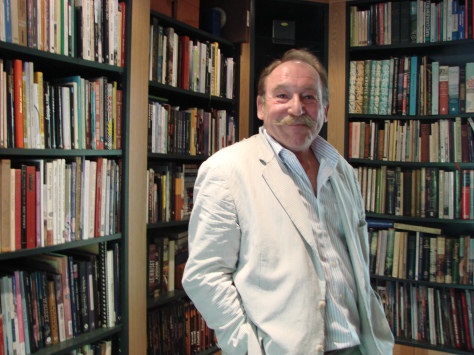
I had the immense privilege of interviewing, filming and sharing (several) drams with Charlie at his home. We talk about the upcoming Dornoch Whisky Festival and everything else in between.
I hope you enjoy reading it as much as I enjoyed taking part in it.
Charlie how did you start your career within the whisky industry?
I actually started via a writing career, I was doing some commercial copy writing and found myself as a literacy agent, I carried out some ghost writing and then started to write Scottish non-fiction books, about Clan history, Tartan history and other such topics.
Then as the whisky industry started to focus more on promotion, I landed my first whisky writing job for Bells in 1981 and then throughout the whole of the 80’s I found myself writing more and more directly for the distilleries, it could be brochures, or snippets of whisky information.
During 1981 Macallan and Glenmorangie really began to promote their single malt, really taking their cue from the success that Glenfiddich had been achieving with their single malt since the 1970’s. Times had been quite hard in the 70’s and often there were not that many single malts available and those that were available tended to be bottled by G&M or Cadenheads.
It remained that way for a while, until in 1987 Allied Distillers arrived and in 1988 United Distillers appeared on the scene, or Diageo as they are now known, that helped change the shape of the scotch malt whisky landscape, and I found myself writing more and more commercial distillery pieces.
However I really wanted to write a book, I always liked to have one on the back burner and I didn’t at this time, I felt that as I had several books behind me and now had significant amount of whisky knowledge and writing behind me I could approach a publication with a proposal for a book specifically about whisky.
I made a proposal to Mitchell Beazley who had published various pocket books, namely, at that time, about wine, with Hugh Johnson having written the very popular pocket book of wine.
It was that which got me started writing my own thoughts about scotch and with that the, The Pocket Book of Scotch Whisky was published in 1992 and other publishers began approaching me to write about different aspects of whisky.
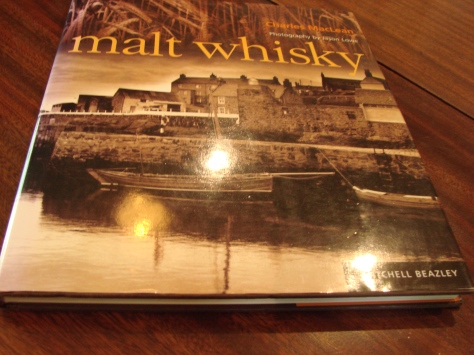
One of my most significant books was, Malt Whisky printed in 1997, again published by Mitchell Beazley which was translated into many other languages worldwide. It’s delightfully illustrated, it takes you through the whole process of whisky, the history behind it and there are even some tasting notes.
I carried on writing for distilleries, whilst continuing to write books and was very honoured to write both notes and the literature to feature with the 70 year old Glenlivet release by G&M (Gordon & MacPhail) which at the time was the oldest whisky to have been released.
When a whisky that was even older was released, which was the more recent 75yo Mortlach, again from G&M I was asked once again to write the tasting notes and information, which would be presented alongside the bottling.
Back in 1998 I was the first Editor of Whisky Magazine and I helped Diageo to set up their Malt Advocacy course. There has been the expansion in festivals now and I worked on the very first Whisky Live back in 1998/99.
I’m also whisky consultant to Bonham’s Auctions, which is a very interesting role within itself.
As the years have flown by I find myself increasingly busy, as well as always writing, I present a lot of events and shows, often at the request of the distilleries and I still haven’t lost my love of writing books. I think last year I worked out that I had travelled abroad 23 times and visited 17 different countries, and I don’t see this year being any different.
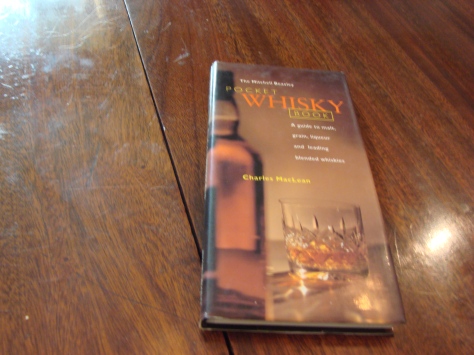
I’ve now published 15 books about Scotch Whisky and have been Managing Editor for a further three books including World Whisky and, as you know, I write heavily for Whiskeria.
What does being a Managing Editor entail?
It’s a very interesting job, and in some ways it’s almost more in depth then writing an entire book. I often write the introduction to the books, I collaborate and pull in writers who I personally think will work very well on the publication in question, more often than not I also write several sections of the books as well, usually the sections nobody else wants to cover. (With that Charlie raises an eyebrow and before we know it we are both in fits of laughter).
How did you discover that you had this talent, not only for writing about whisky but for nosing and tasting also?
It was when I was obtaining my first degree in Art History, (yes, that’s the first degree, Charlie has a further degree in Law), that I really found a love of all things Scottish, and that only continued as I began ghost writing. The history and the people, the food and drink were all so integral and so exciting, and I’ve always been keen on food and drink.
There were so many examples throughout history, of whisky bringing people together and just being such a large part of the Scottish landscape.
I then really accidentally fell into learning, that I could possess the ability to learn so much about whisky by writing about it, then I took a place on the Sensory course (the highly acclaimed: the sensory evaluation of potable spirits, as held by the Scotch Whisky Research Institute in 1992), this was all to chance really as the course was full but then had a cancellation, but that course really did change my life.
It was so intense and I learnt so much over such a relatively short amount of time, but it was a complete shift of everything I knew, and everything I had being learning over the years all clicked into place.
However I always say we really are all equipped to do this, and the most important thing is practice, taste, taste and taste again.
Of course it helps if you are able to convey the aromas and the taste, and to make them almost tangible, that’s what makes the difference between some good whisky notes and some great whisky notes. It’s very easy to throw out a couple of flavours that you find and to briefly talk about a finish, but to my mind that isn’t writing tasting notes. When all is said and done however, never forget whisky is there to be enjoyed more than anything else.
Was your father a keen whisky drinker?
Certainly not to the extent that I am but I remember he had a couple of bottles of blended scotch but these really were for high days and holidays. My grandfather was a wonderful radiologist in the 1930’s and I remember that he had a small cask which he would have filled himself.
My best friend was Charlie Grant and he was the son of the owner of Glenlivet, and I remember many happy holidays spent at Glenlivet either in the warehouses or just in the distillery itself.
We had some really wonderful times together with so many happy memories, and many of them relate to whisky. He was a really wonderful friend, and we spent so much time together. Tragically Charlie and I were involved in a head on collision and whereas I was lucky to be thrown from the car, Charlie passed away at just 21 years old.
Did you always want, and believe that you would have a career in whisky?
Honestly, no. It has taken, and continues to take a lot of hard work. Especially when it comes to writing books. It took almost four years of full time research to write my first book, and The Scotch Whisky Liquid History took five years. It’s a huge commitment without much money coming in, it’s a very stressful period and you have to be very motivated every day.
I have the most curious love/hate relationship with writing books, you can do years of research and think that you aren’t really progressing anywhere, then suddenly you have a lightbulb moment and a whole large piece of the jigsaw puzzle just suddenly falls in to place, you just “get it” and there’s no feeling that can compare to that.
It really requires a great amount of discipline and in some respects writing for publications etc. for somebody else is easier as you are working to a strict deadline, but as much as I enjoy that, there is something about writing books that draws me back in every time.
What have been the biggest changes you have seen through the years within the industry?
The most obvious for me, is the growth in interest in the malt whisky, I’ve seen it go from being really all about the blends to then seeing malt whisky just take off.
It’s easy to forget that it was only in the late 1980’s that Malt has really taken off. I think that back in 1970 single malt accounted for less than 1% of all whisky that was bottled, compared to now where it’s 25% by value. That kind of growth, really is remarkable, it’s quite unusual.
How do you see the landscape of whisky changing in the future?
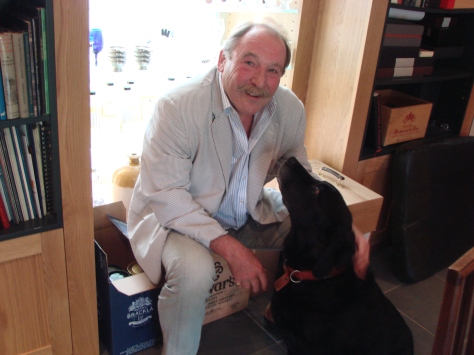
Whilst it can be difficult to predict the future, the whisky industry has always followed a cycle of boom and bust. The whisky industry has been through many a hard time, the 1920’s and 1930’s where difficult with many shortages brought about by the World Wars. However, after the war, scotch was very much seen as the drink of the free world, although mostly these would have been blends.
New distilleries started to appear and production expanded and that expansion continued well into the mid 1970’s to 1980’s, unfortunately the depression started to hit, and there had been a massive over production with an estimated four times as much whisky in bonds, than had been produced throughout the whole of the 1960’s, and then popularity suddenly died. It was a disaster.
Vodka was taxed far more favourably and became a very popular spirt, being cheap, easy to mix and accessible, wine had very much become the drink of choice, and as dinner parties grew more popular this further fuelled the wine market, plus there really were some fantastic wine’s available at the time. It was the lack of interest and popularity which sadly lead to 21 distilleries closing in 1991 and sadly 19 of those never operated again.
It wasn’t all doom and gloom however, and by 2004 there were 21 new distilleries of varying capacity, including Roseisle. The market still needs to grow and is showing continued signs of growth. There are now many more distilleries that have opened, which, although can only be positive, there are some smaller distilleries that if a decline was to start, may well struggle.
The industry is still riding high at the moment and hopefully this will continue for many years to come, and the interest in whisky will grow and grow, with more women and younger drinkers showing an interest and pathing the way for that continued growth.
As the market for whisky festivals continues and the more knowledgeable drinkers become, the more people feel like they really understand what they are drinking, this is when you truly fall in love with scotch.
Do you think that “Brexit” will have an adverse effect on the industry?
This had people quite worried, and in fact it probably still does, and the pound has taken a battering, as was to be expected, this is likely to be merely temporary however, and it’s actually left the market very buoyant.
Many of the plans and laws that govern whisky were put in place by the EU and were most cumbersome and made away from any industry advice.
To that end we should be able to negotiate far better deals and put in place both laws and plans for the growth of the whisky industry that have been developed by the people who know the industry inside out. It makes perfect sense and there are many reasons to be hopeful that “Brexit” will be a very good thing.
We have seen quite a rise in whisky for investment, what are your thought on this?
There have been collectors around for many years, with many of largest collectors being Italian, however it certainly seems to be a growing trend.
Obviously if people are collecting whisky then it is being sold which is what distilleries needs, however it can end up in very good whisky never being drank and merely sold in a cycle on the secondary market, which is a shame.
I think we all agree whisky is there to drink, it’s terrible to think that the whisky drinkers of the world missing out on bottles due to collectors with deeper pockets.
It has a place, but the more whisky bought to be drank by the people who truly love it, the fans if you like, then the better.
As prices of good whisky continue to sky rocket, many whisky fans are turning to other spirits “malternatives”, such as rum, gin, cognac and others, is this a worrying trend?
To be honest as I am so embedded with whisky I was unaware of this pattern and the growth and interest in other spirits, and whilst I can see why this is coming about, scotch is still in a very commanding position.
Although the industry can, by no means, become complacent, scotch is always going to be there, and once you fall in love with scotch you can never stay away too long.
What are your thoughts on whisky aimed to “convert” non whisky drinkers or younger drinkers (of legal age)?
It’s always been said that Scotch whisky had failed to recruit new drinkers, in particular the younger drinkers, however scotch and the palate are so complex that in most cases trying to lure younger drinkers is somewhat futile.
Personally I don’t think the majority of people really appreciate scotch until their mid 20’s and it is very heartening to see many whisky festivals with plenty of people from all age groups, with growth of both women and a younger audience. This is caused by the growth of interest and knowledge in whisky, the easier accessibility, the digital age with whisky fans connecting and not by any such single bottle!
With that in mind you could argue that any products are unnecessary (at this point Charlie and I have a very long discussion about the above and have decided not to bore you all, that said it was agreed that Haig Club is not something that was aimed at either one of us and not something that either would have an interest in, and recommend looking into older grains, or even trying a bottle of Cameron Brig itself, for less money, however, that’s merely our thoughts, go out there and try anything your palate or budget fancies.)
What advice do you have for people that want to try drinking whisky for the first time?
My best advice is to get together with some friends, go to a bar with a good range of malts, and friendly, knowledgeable staff. Ask for three or four drams of different regions/styles, make sure it’s in a proper glass (Glencairn, or a tulip or nosing glass, but not a tumbler), share them, and most importantly, talk about them. See if you can all settle on a style you enjoy the most.
Once you have decided what that style is (and over time that may change), go back to the bar and then ask for a further selection of whiskies (maybe three or four) of your chosen style, and again taste, explore, talk about what you like, what you don’t like, what flavours you may find, or just how it feels on the palate, have fun.
Scotch is about so much more than just a drink, it needs the social aspect, it’s made to be talked about, to share knowledge and friendship, that’s what makes it so enjoyable.
There is an increase in women both working within the whisky industry itself, writing about it or merely drinking whisky, do you see this as a good thing, is it still something that needs to be seen as an unusual?
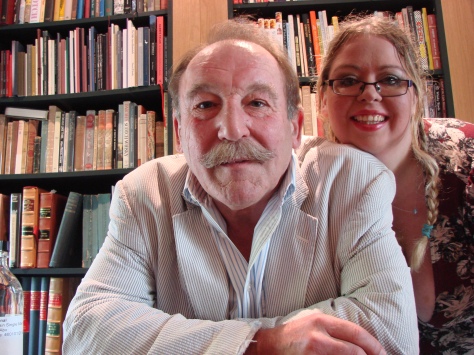
Unfortunately I do think that in some quarters, more certain drinkers of whisky, than the industry itself, there are those that are still surprised at just how knowledgeable women are about whisky or that they genuinely enjoy drinking it.
Personally I welcome it, women have been said to have far better noses, and this in part could be because they are exposed to far more scents in childhood and whilst growing up, flowers, perfumes and various scents that having children brings. Such as vanilla, baby sick and even dirty nappies have notes that can be found within whisky itself.
Also woman tend to use so many more words then men, and that greater vocabulary can mean women are far better at being able to articulate, allowing them to more accurately put across what they can find whilst nosing a whisky.
What are your thoughts, on a certain writer, that shall remain nameless, dictating the number one whisky in the world and the popularity that whisky then receives, with the prices jumping and so many wanting to buy it?
Personally I think it’s utter rubbish that there is a best whisky in the world. Tasting whisky blind is one of the hardest things you can do and even with great experience I still find it hard. I obviously write a number of tasting notes and have tasted many whiskies and I do not, and have not, ever gone public with scores.
I think that it would be very unfair of me. I think it is particularly arrogant for any individual to pronounce a whisky as the best in the world. Is Scotch better than non-scotch? Of course not, it’s just different.
I am of course very aware of the publication and the person we are talking about, and I think “that” book is merely for commercial profit, and not to the benefit of the whisky industry at all.
It’s fair to say that a falling out with the Scotch Whisky Industry four years ago and the choice of a “best whisky in the world” for the past several years all being non Scotch is not a coincidence.
(As you can imagine we had far more “off the record” conversation on this topic), for legal reasons I would like to state that any person (and/or) publication that you may think this question is about is merely your own perception. That should keep the lawyers off my back.
What are your thoughts on the recent glut of non age statement whisky (NAS) and the debates it has caused?
I am also fairly sceptical of some of the NAS offerings, there are several out on the market, that in my mind are just not well produced whisky and something I wouldn’t personally want to drink, however they are doing very well in sales and are often found in supermarkets, so there is clearly a market out there for them.
However there are some very good whiskies out there that do not have an age statement and despite the industry telling us all for so many years that age was everything, it is not always the case, it’s worth remembering that every single distillery can produce a bad whisky or end up with a poor cask, it happens.
(At this point Charlie pours me a Macallan that is yet to come to market, but is NAS, we discuss the 1824 Series in great detail, and agree that this whisky poured was actually very good indeed, it tasted like the famous Macallan house style you would expect.)
What is your earliest whisky memory?
It is of the many summers spent with Charlie (Grant) up in Glenlivet and in particular of tasting a cask sample in the boardroom and actually not particularly enjoying it but brazening it out all the same, thinking that I had to like it.
In hindsight it was probably something wonderful and old, but at that time it was lost on my palate, probably as I was too young, or inexperienced to appreciate it.
Having achieved so much within the whisky industry, what would you say your biggest achievement was?
I think it would have to be having the endurance required to continue to write books, in particular the book Whisky: A Liquid History.
As mentioned you really have to believe in yourself, and keep juggling finances and other commitments, it would have been so easy to give up, although I am very glad I didn’t.
If you could drink only three whiskies for the rest of your life, what would they be?
After much chuckling: I couldn’t possibly choose just three whiskies, as I am so privileged to have tasted many, many great whiskies, also every distillery is possible of creating the most wonderful whisky or a dog of a whisky at any time
One of the many events you have in your diary this year is the Dornoch Whisky Festival, and we have a few video clips that can be found on our facebook page here, where you talk about the Festival, I thought we would discuss it a little here too.
What are the events that lead to you being involved with the Dornoch Whisky Festival?
As I remember it, I was approached by somebody on the whisky festival committee, whisky festivals, if run correctly are always great fun, and new festivals are very exciting, that coupled with the fact that Dornoch is a stunning location with such lovely scenery and distilleries, it couldn’t fail to be a great experience.
Why is Dornoch in particular a great location for a festival?
Although it is quite far north that is part of what makes it so special, it really is a whisky pilgrimage and one well worth making. There are some really special distilleries that you just wouldn’t normally have the chance to visit.
The scenery is stunning, with some fabulous beaches, and whisky venues that are second to none, such as the Dornoch Castle Hotel and if that wasn’t enough there are some of the best golf courses in the world.
Are you looking forward to the Dornoch Festival?
Very much so, this is the second year, although the first year was really the festival just finding its feet.
This year there are even more exciting tours and events planned, including the Gala Festival Tasting, which promises to be a great event and also features your exclusive Master Class on Chocolate and whisky (we are hosting a Master Class for which Charlie will be drawing the tickets for entry to this event, as it is strictly limited).
I am also hosting several events myself, including master classes and tastings, and I look forward to attending many others.
As you mentioned Dornoch have some fantastic golf courses, do you think golf and whisky make a good coupling?
Absolutely, in fact I think that they go very well together indeed. You could argue that whisky and golf are two of Scotland’s great ambassadors. Putting them together is only logical and makes perfect sense, and do that over the course of a whisky festival is such a simple, yet wonderful idea.
There is the exclusive chance to play the championship course at the Royal Dornoch Golf Course by taking part in the Whisky Festival Open Stableford (find more about this here), I even hope to get a chance to tee off at some point too.
You are hosting a few events during the course of the festival, tell us about them?
I am fortunate enough to be in the position that I am hosting the opening event, which is a screening of The Angels’ Share at the Balblair Distillery, which is where much of the filming took place.
I will welcome you all with a special dram from Balblair itself, talk you through the whisky and the tasting and then I have to talk to you a little about the filming of the movie, of which I played a part, and maybe reveal a few secrets or two, there are still a few tickets available if you are quick.
There are buses to then take any guests that are booked into my next event, which is the gala dinner at the Links House, in partnership with Balblair.
There’s the main event, which is the gala tasting on the Saturday with tickets available here, followed by a Taste of the Highlands Master Class which I am hosting at the Carnegie Whisky Cellars, which is next door to the gala tasting venue.
There are still some tickets available for this (here), however you will need to be fast, as it is very exclusive. We will be tasting some amazing whiskies which I will talk you through.
There are some fantastic events running throughout the rest of the festival.
Are you looking forward to the gala tasting?
Very much so, this is the heart of entire weekend. A whisky festival with all the local distilleries bringing bottles both for tasting and for sale on the day.
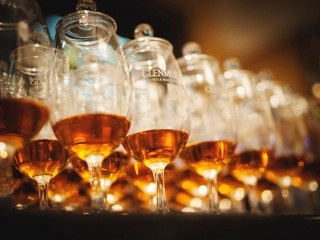
Everyone receives a goody bag with glencairn, programme for the day and a raffle ticket for a draw to an exclusive chocolate and whisky masterclass hosted by Whisky Corner.
I’ll be looking around the tables and will look forward to speaking to people who have attended the festival, and in spending sometime in the masterclass as well.
It’s a great event, and the venue, The Dornoch Castle Hotel is a stunning venue. There is also a selection of local produce available on the day as well. If you don’t already have a ticket then you should. Tickets are available here.
As you mentioned earlier Whisky Corner are hosting a whisky and chocolate tasting masterclass on the day, are you looking forward to this event?
I am, I still really enjoy the pairing of chocolate and whisky, I enjoy seeing what flavour combinations that have been put together, and seeing how that changes the whisky.
It’s interesting to see whether or not the chocolates have been chosen to enhance and complement the whisky, or if it’s been paired to completely contrast, which is also interesting.
I’m honoured to be drawing the tickets, as it’s an exclusive event limited to only 25 places, and with a ticket in each goodie bag, everybody has a fair chance of attending.
There are many special distilleries up in Dornoch, but if there were only one that you could visit over the course of the festival, which one would you suggest?
There are just too many fantastic distilleries to decide, however, there are some distilleries opening their doors that the public aren’t usually able to see. Take a look at the festival page here and make a choice for yourself, whichever distilleries you visit you won’t be disappointed.
The opening event is at Balblair Distiltillery, where much of The Angels’ Share was filmed, how does it feel to be going back?
It will be wonderful, it will bring back some very happy memories, it really will be a great day for me, and hopefully for everyone else. I have such happy memories of working with Ken (Loach). He is so polite and seeing him work was just wonderful. We had such a laugh during filming and a great camaraderie on set. I’m delighted that this is how the festival is starting.
One of my favourite memories of filming is after we shot the auction scene, I went out for a cigarette, and Ken liked the scene so much he decided to keep it in, the only problem was we had to film it about six times in a row!
How did the part in The Angels’ Share come to be?
Back in 2010 I received a call from a production company in London, it was the screen writer Paul Laverty, who usually works with Ken Loach, and so I soon sat up and paid attention. I was told that they were looking at producing a film about whisky, which is so different to a documentary.
It so happened that we both had an opening and agreed to meet up for a dram. Paul is an absolutely delightful character, we got on so well. Originally Paul worked as a human rights solicitor, and is a married to a lovely lady who is also a human rights lawyer and then found he was a talented screenwriter.
Initially they were looking for a script consultant which I was more than happy to help with. I could help them look for props, contacts and locations and in February 2011, so about a year later, an outline script had been produced.
The really interesting thing about Ken, is that he never lets anyone have access to the script until the day of shooting, or maybe if it is a particularly complex scene the day before but that’s it. Not only that, he only even shoots sequentially, although it costs more money, it’s just the way Ken works, it’s really magical.
Ken likes to mix trained actors with people that haven’t acted at all, and with The Angels’ Share, three out of the five main characters, including Paul Brannigan, hadn’t acted before, although you wouldn’t know it.
The auction scene came about as Michael Urquhart had wanted to auction off a bottle in order to raise money for the victims of Japanese Tsunami, it was a bottle of the G&M 70yo Glenlivet.
We spoke about the best way to reach the maximum amount of money, and as I know Miranda Grant (Managing Director of Bonham’s) and she’s a real character, and although we knew there was a chance the majority of the bidding would happen over the internet, she was very keen to get behind such a good cause and organised a bit of a party whilst we auctioned the bottle.
I’d spoken to the Producer of the film Rebecca O’Brien and asked if Ken would like to see how a whisky auction worked, he loved the idea and came down to the auction itself and he absolutely loved it.
It was then he offered me the part in the movie. I couldn’t believe it and to be honest the first thing I said, was “but I’m not an actor” and Ken said, that’s exactly the point. The rest, as they say is history. It was so great to be part of that project.
Would you like to act again?
Yes, I’d love too, I’m just waiting for the call from Hollywood, and so if anyone reading this wants to offer me another film role, they can feel free to call me.
What is it like being the Charlie MacLean, somewhat the godfather of whisky?
Charlie was very shy at this point. It’s incredibly flattering that anybody thinks that, but it’s actually quite at odds with who I am out with the spotlight.
Although people might find it hard to believe, I am quite shy. I feel incredibly unworthy of such a title, I’m just a man that has written books and enjoys to share a whisky with people. I love meeting people and hearing their stories and being part of their world, even for a moment.
And with that, the interview was finished, Charlie visibly relaxed and we enjoyed a good conversation and a few drams afterwards, and for me, it is one of the best ways I have ever spent a Friday.
As much as he may protest, Charles MacLean really is as special as everyone says, and if you have a chance to meet him, don’t ever be shy, you could not find a more polite, generous man to speak to. He really is a true gentleman and as much as I know how much he will hate me saying this, he really is a true whisky legend!
Kirsty Clarke (@kirstyclarke29)